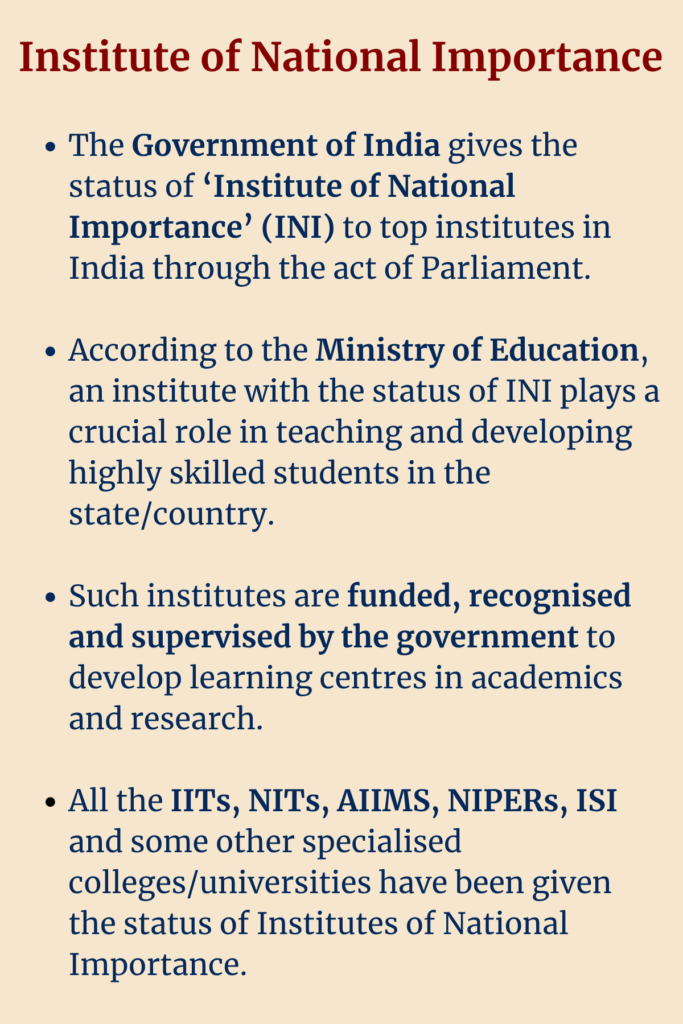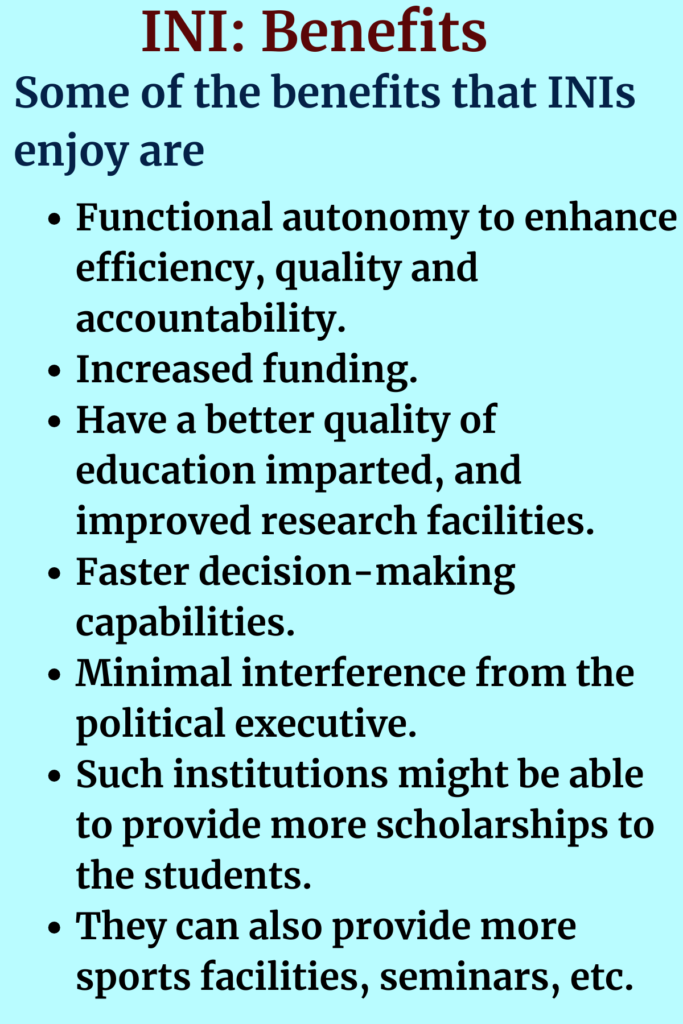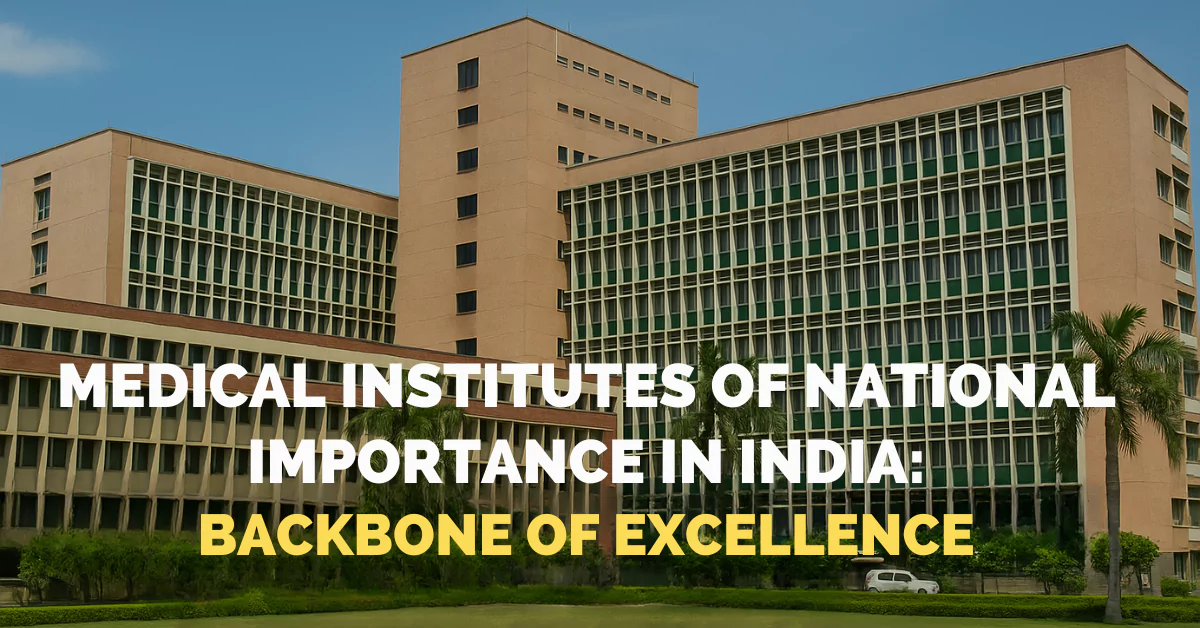Medical Institutes of National Importance in India: India’s Institutes of National Importance (INIs), designated by Acts of Parliament, are recognised as premier institutions spearheading medical education, research, and public health in the country. These prestigious institutions receive autonomy, enhanced funding, and are crucial in shaping India’s healthcare landscape.
Institutes of National Importance
According to the Ministry of Education, an institute of national importance is an institute that “serves as a pivotal player in developing highly skilled personnel within the specified region of the country/state”.
- This definition was given in the repealed Indian Institute of Technology (Kharagpur) Act, 1956 and the Indian Institutes of Technology Act, 1961.
- Section 22 of the University Grants Commission Act, 1956 gives ‘Degree Granting Status’ to such INIs established by an Act of Parliament for conferring or granting degrees.

Medical Institute of National Importance in India: Summary
| Institute | Location | Founded | Specialization |
| AIIMS | Delhi + 20+ cities | 1956 | UG/PG Medicine, Research, Public Health |
| JIPMER | Puducherry | 1823 | UG/PG Medicine, Research |
| PGIMER | Chandigarh | 1962 | PG/Doctoral Medicine & Research |
| NIMHANS | Bangalore | 1925 | Psychiatry, Neurology |
| SCTIMST | Thiruvananthapuram | 1976 | Biomedical Technology |
| NIPERs | 7 cities | 1998+ | Pharmaceutical Sciences |
Medical Institute of National Importance in India
1. All India Institute of Medical Sciences (AIIMS)
- First Established: 1956, New Delhi
- Legislative Act: All India Institute of Medical Sciences Act, 1956
- Campuses Today: AIIMS Delhi plus 20+ new AIIMS (e.g., Bhopal, Bhubaneswar, Nagpur, Bathinda, Bibinagar, etc.)
- Highlights: Regarded as Asia’s foremost medical institution, globally competitive PG/UG programs, cutting-edge infrastructure, and socio-health outreach.
- Recent Development: AIIMS Nagpur hosted India’s first Best Practices Conclave, hailed as a “torchbearer of innovation” by Union Health Minister Nadda.
2. Jawaharlal Institute of Postgraduate Medical Education & Research (JIPMER), Puducherry
- Founded: 1823 under French India (L’École de Médecine)
- Renamed: Dhanvantri Medical College (1956) to JIPMER (1964)
- Status: Declared an INI by Parliament
- Reputation: Nationally ranked (#5 NIRF Medical, 2024). Center for high-impact research, rigorous PG programs, and NMC-approved MBBS.
3. Postgraduate Institute of Medical Education & Research (PGIMER), Chandigarh
- Established: 1962
- Status: INI under PGIMER Act
- Strengths: Premier PG and doctoral training institution with a reputation for specialised clinical care and medical research.
4. National Institute of Mental Health and Neurosciences (NIMHANS), Bangalore
- Origin: 1925; elevated to INI status in the early 2000s
- Expertise: India’s apex neuro-psychiatric institute—comprehensive mental health services, cutting-edge research, PG and doctoral programs.
5. Sree Chitra Tirunal Institute for Medical Sciences and Technology (SCTIMST), Trivandrum
- Established: 1976; recognised as INI
- Jurisdiction: Under the Ministry of Science & Technology
- Focus: High-end medical research, biomedical technology, cardiac and neurological specialities, national patient care services.
6. National Institute of Pharmaceutical Education & Research (NIPER)
- Founded: 1998 onward, seven campuses including Mohali, Ahmedabad, Guwahati, Kolkata
- Specialisation: Advanced pharmaceutical sciences education and research under the Department of Pharmaceuticals, Central Government.
Benefits of the Institute of National Importance in India

Why These Institutes Matter
- Autonomy & Funding: Direct federal funding and administrative independence ensure high standards in education, research, and public service.
- Regulatory Role: Under the NMC Act, these institutes offer standardised medical education and exit exams (NEXT), ensuring uniform quality.
- Centers of Excellence: They frequently pioneer medical technologies, policies, and provide national-level healthcare leadership and community service.
Recent Developments & Challenges
- Expansion & Innovation: AIIMS Nagpur’s conclave showcases new AIIMS emerging as an innovation hub.
- Quality Assurance: Widespread issues at state colleges prompted NMC actions, reinforcing the importance of INIs in maintaining national standards.
India’s Medical Institutes of National Importance symbolise excellence, innovation, and equitable healthcare. From legacy institutions like AIIMS-Delhi and JIPMER to specialised centres like NIMHANS and SCTIMST, they form the backbone of India’s medical education, research, and public health systems.
As India strengthens its healthcare infrastructure and reforms medical regulations, these institutions will continue to set the benchmark for quality, accessibility, and impactful healthcare solutions nationwide.

